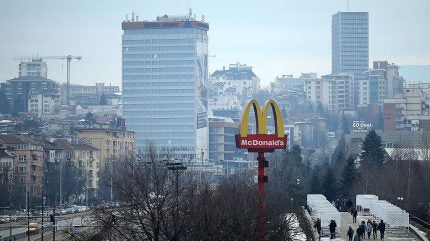

Bulgaria experienced a significant drop in foreign direct investment (FDI) inflows in the first half of 2020, representing a 32.8% year-on-year decline, according to data from the Bulgarian National Bank.
The data shows that FDI inflows stood at €263m over the first six months of the year, down from the €391m that the country attracted in the same period of 2019.

Discover B2B Marketing That Performs
Combine business intelligence and editorial excellence to reach engaged professionals across 36 leading media platforms.
The outbreak of Covid-19 pandemic in March adversely affected Bulgaria, with the country’s economy contracting by 9.8% over the second quarter of 2020, down from slight growth of 0.3% in the first three months of the year, according to data from the country’s National Statistical Institute.
Bulgaria’s transition from communism to consumerism
Bulgaria’s attractiveness as an investment destination started to develop in the early 1990s, as the country’s economy transitioned from communism to a free market model. When the communist regime came to an end in 1990, FDI inflows in the country were very small, at about $4m, according to data from the UN Conference on Trade and Development.
However, this figure rose rapidly during the 1990s and early 2000s. Bulgaria hit its peak in 2007, the year that it became a member of EU, with FDI inflows amounting to $12.38bn. Nevertheless, the country’s FDI inflows have steadily declined since that 2007 high. Bulgaria received $1.22bn in 2019, slightly higher than 2018 where it attracted $1.21bn, but down on the $1.82bn from 2017.
Despite the decline in FDI inflows into Bulgaria over the past decade, there has been an increase in the number of greenfield investments over the same period, with the country securing 110 investments in 2019, up from 104 in 2018, and 75 in 2017.

US Tariffs are shifting - will you react or anticipate?
Don’t let policy changes catch you off guard. Stay proactive with real-time data and expert analysis.
By GlobalDataIn regards to the country’s FDI stock, it rose to $51.85bn in 2019, up from $50.38bn in 2018, and $50.9bn in 2017.
Among the economic activities to receive the highest levels of FDI inflows in 2019 were wholesale and retail trade, the repair of motor vehicles and motorcycles, real estate activities and manufacturing, according to data from the country’s national bank. Other activities that score highly are information and communication technology, agriculture, and electricity and gas.
The data also shows that the UK, Netherlands, Germany, Russia, Austria and Luxembourg – in that order – were the countries to invest the most in Bulgaria in 2019.



